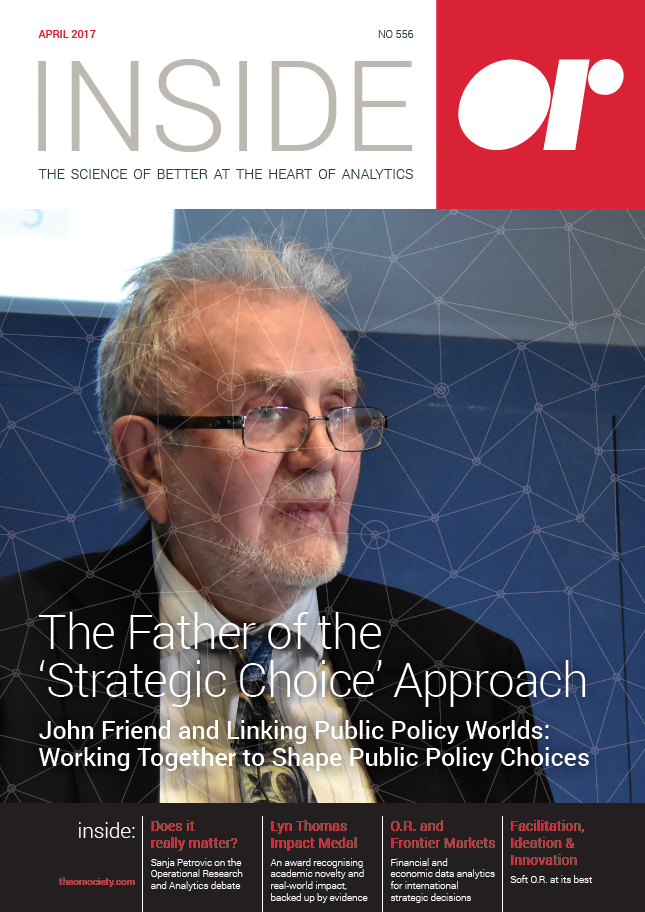This month, we have a helpful exploration of the OR-Analytics debate by Sanja Petrovic; reports of the two excellent talks given at this year’s Beale Lecture; a celebration of Soft OR from Louise Maynard-Atem; and an obituary of Professor Neil Doherty who transformed our understanding of information systems.
Does it really matter?
SANJA PETROVIC, VICE-PRESIDENT OF THE OR SOCIETY, NOTTINGHAM UNIVERSITY BUSINESS SCHOOL
We have all witnessed a lot of debates about the relationship between operational research and analytics and the differences between these two areas. At OR58, we enjoyed the debate on this topic between Cathal Brugha, Emeritus Professor of the University College Dublin, and Professor Stewart Robinson of Loughborough University. To add a sort of confusion, there are other terms on the stage of management, including Business Intelligence and Data Science. I have recently started teaching a module called Business Intelligence and Analytics at University of Nottingham and the first thing that academics do is to understand clearly the meaning of the terms that will be used in lectures.
Business Intelligence means different things to different people. Traditionally, Business Intelligence has been used as an umbrella term to describe concepts and methods to make more informed business decisions by using diverse data. It encompasses a wide variety of methodologies and tools that enable organisations to collect data from internal and external sources, organising them in data warehouses and prepare it for analysis. According to some literature and authorities one of the main objectives of business intelligence is to enable business managers to define and run queries against the data, and to create reports, with a special emphasis on visualizations, dashboards, etc. It targets corporate decision makers as well as front line managers.
One can say that analytics is the term that is used in both business intelligence and data science. Analytics refers to a variety of different business intelligence and application-related initiatives that involve statistical and mathematical data analysis that clusters, segments, scores and predicts what scenarios are most likely to happen. However, this initial definition could be extended to analysis of data to make (hopefully optimal) decisions. As it is commonly accepted, there are three main types of analytics. Descriptive analytics, which uses data to understand past and present (what happened?); predictive analytics, which analyses past performance to determine what is likely to happen in the future (what is likely to happen?) and prescriptive analysis, which uses different optimisation techniques to find out what could happen and to make decisions to achieve best performance possible (what should we do?).
A provocative question is if prescriptive analytics is a synonym for operational research? Also, what is the key difference between analytics and business intelligence? A traditional view is that analytics has predictive capabilities, while business intelligence is focused on analysis of historical data and reporting capabilities. Business intelligence aims at business managers, while analytics results are simply for 'technical' people. Data science is a recently coined discipline that refers to the process of deriving understanding, significance and form from the myriads of variety of both structured and unstructured data. It seems that some statisticians can be easily upset with this term as they may see data science as another name for statistics.
In a way, data science enables and improves the use of business intelligence / analytics tools. In my opinion, the borders between these three areas are not rigid at all, on the contrary they become more and more blurred. Do we need to care about differences? I do not think that there is a simple answer to this question. On one hand, it is important to define each discipline so that organisations understand what value each discipline can offer to them. On the other hand, it is most important is to develop methodologies that will enable organisations to get the most out of their data hand in hand with rapidly developed technologies that enable collection of myriads of data. There is a shortage of skilled people (call them data scientists, analysts or operational researchers). Some universities have started to offer adequate undergraduate and postgraduate degrees to satisfy the thirsty job market for quantitative specialists. They should have knowledge of statistics, mathematics, optimisation and other operational research areas, computer science, data mining, text mining, web mining, and … (did I miss something?). And to understand business application domains.



